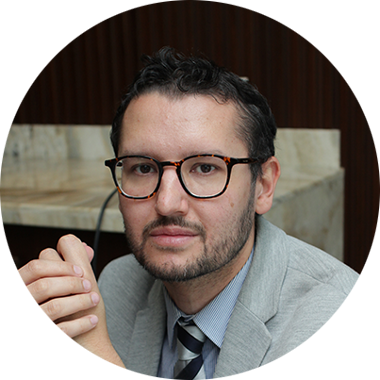
Guillaume Simonian
Emergency Preparedness and Response Lead,
Health Emergencies Programme - Ukraine Country Office
Guillaume Simonian wears many hats in the WHO Country Office in Ukraine but the one that stands out is the “A-Team” hat that he wears whenever an emergency strikes, anywhere in Ukraine. It stays on while he and his team work to help those in need until, he says, “the cavalry arrives.” He manages the Ukrainian incident management system team, which responds to emergencies until the network of strategic processes, partners and practical support laid out in WHO’s emergency framework can provide backup or until the event is fully responded to. In Ukraine, the list of possible emergencies is long and varied, including disease outbreaks, conflicts and floods. These are all exacerbated by a health system in
constant reform since the collapse of the Soviet Union. The intricacies of how political change affect health in eastern European and Caucuses regions is interesting to Guillaume who enjoyed Gogol, Griboyedov, Dostoyevski, Tolstoy, Shevshenko;and Kundera’s classic and modern literature as a student. “These writings have painted the soul and spirit of this interesting region and being a WHO staff member here offers an opportunity to live this reality and to support local populations in writing the next page of this socially and culturally rich environment.”
Guillaume grew up in the French Alps. He’s an offspring of the mountains, but as a career, he wanted to do something broader and make a meaningful impact. He studied political science and a master’s in social anthropology. After graduating, he worked in the French Ministry for Europe and Foreign Affairs, gained key skills and glimpsed a little of the world of humanitarian work while serving in Russia. He managed to obtain a secondment to UNICEF, to work in emergency early-warning and preparedness, which included simulation exercises and deployments around the world. In 2013 he joined WHO Headquarters, as an interagency focal point for emergencies.
Today, working as the WHO Ukrainian country office lead for the emergencies programme, Guillaume sees every disease outbreak as preventable and as an opportunity to make progress. His work with partner agencies developing clever media and messaging campaigns has helped Ukrainians to understand and gain trust in vaccinations as a new post-Soviet health infrastructure emerges. “We can and have achieved so much for Ukraine,” he says. For example, in the 2015 measles outbreak, Ukraine had the large majority of cases in Europe. This is not surprising: dramatically, Ukraine recently had the second lowest polio vaccination rate and tenth lowest in measles vaccine coverage in the world. But WHO is making a difference: during the ensuing vaccination campaign, the country’s vaccine rate rocketed and although Guillaume always sees room for improvement, he knows that the team made an impact and is proud of their work.
When COVID-19 began, the Ukrainian government requested WHO’s support to assess every hospital in the country for their pandemic response capacity. His team jumped into action by hiring and training all of the country’s bioengineers together with logistics and training companies. All 450 COVID-19 designated hospitals were visited and the assessment was completed in just 2 weeks. It covered hospital infrastructure, equipment, maintenance, HR and provided the data needed to design a map and detailed plan of what the government needed to address for patient care. It was an amazing achievement with life-saving results.
In Ukraine we like innovation and one of the good things about WHO, is that with innovation in health, we can achieve so much.
An emergency, like a pandemic, can occur within other ongoing emergencies, and this is where Guillaume loves to apply his innovative side. He also seems to like rewiring WHO administration to make his ideas a reality, with the goal of using WHO’s capacity to maximum benefit. His background is clearly visible as he works seamlessly with NGOs and other UN and government agencies on health financing, health worker conditions, the rights to health, migrant issues, vaccination certificate capacity, bio resistance and food safety, pulling ministries together to consider health in all policies. He says WHO has a beautiful mandate which positions us in a co-leading role for health, but he also notes the importance of health diplomacy. WHO Ukraine has had the opportunity to connect with the Ministries of Justice, Agriculture, Social Policies, and Education, and this is key to a global understanding of health in any country. His attraction to the region’s culture, which he calls “organized chaotic smart-craziness,” allows him to make sense of complex situations. The key, he says, is to use our time carefully and prioritize the most important issues where we can have the most impact. He adds that we must always consider the practicality of implementing programmes that come from high level ministry decisions, and think the processes through so that they are effective in practice and not just on paper.
Whether it’s big-picture concepts or solutions on the ground, Guillaume is making the kind of meaningful impact that he wanted to, before leaving France. “In Ukraine we like innovation," he says, “and one of the good things about WHO is that with innovation in health we can achieve so much."

